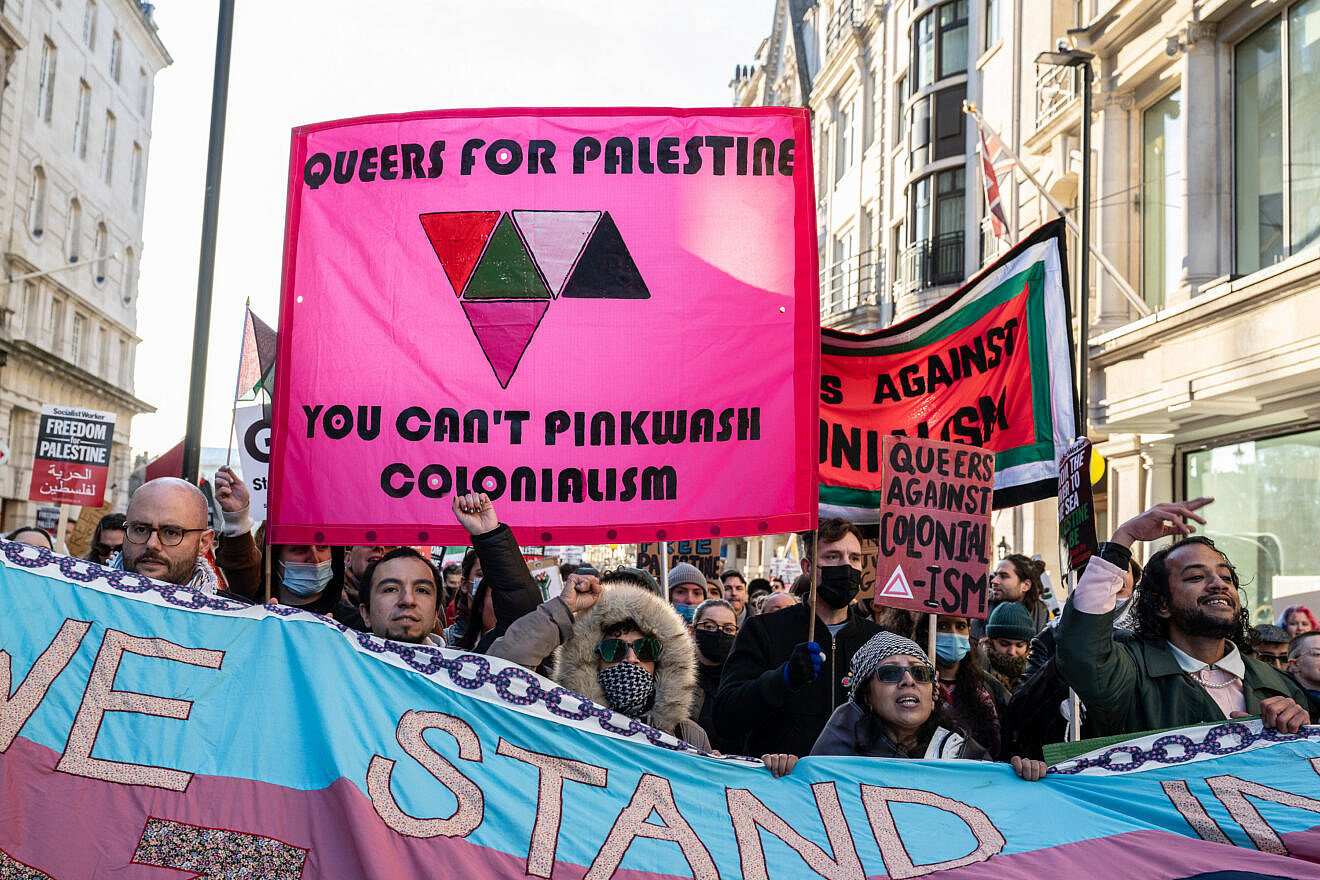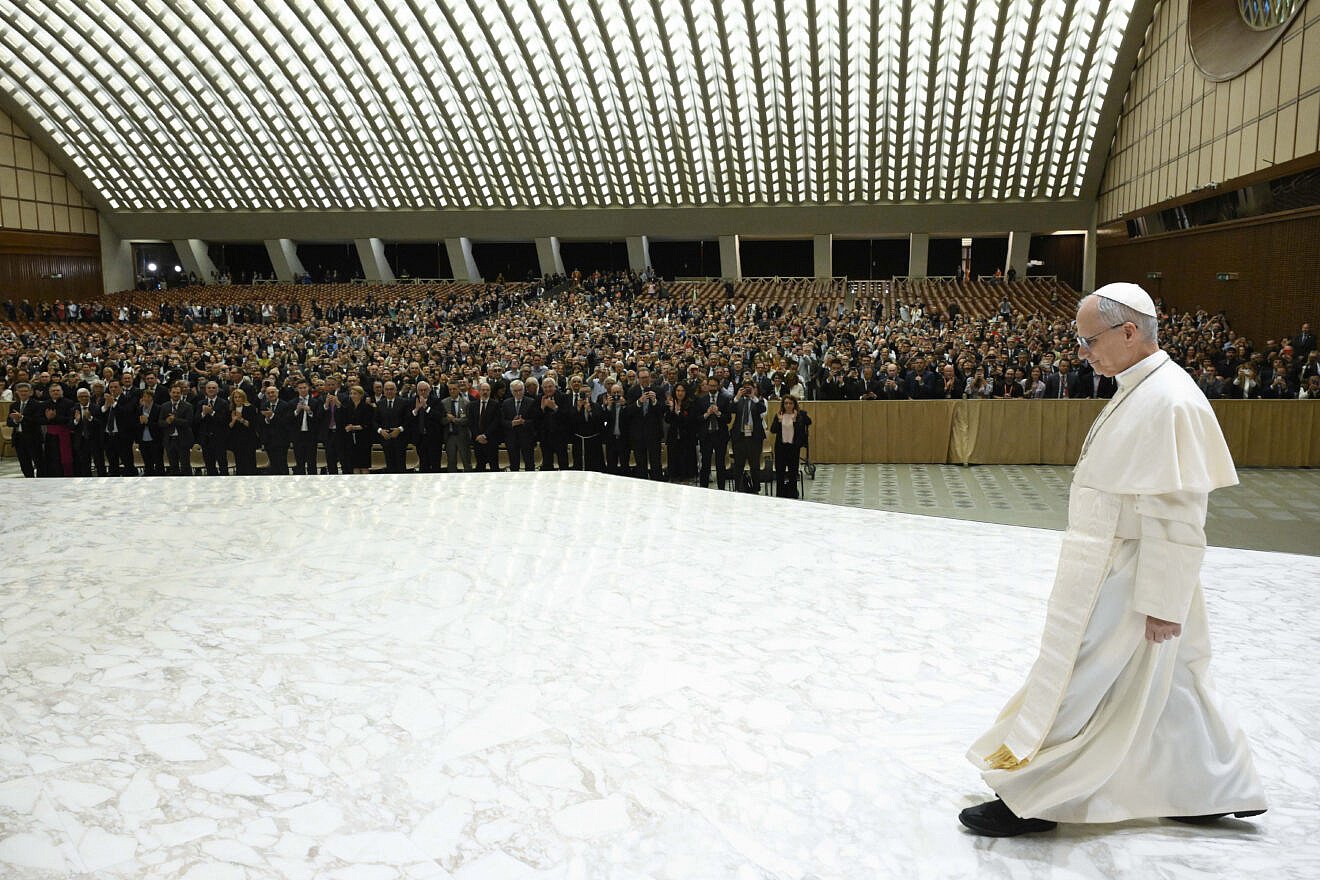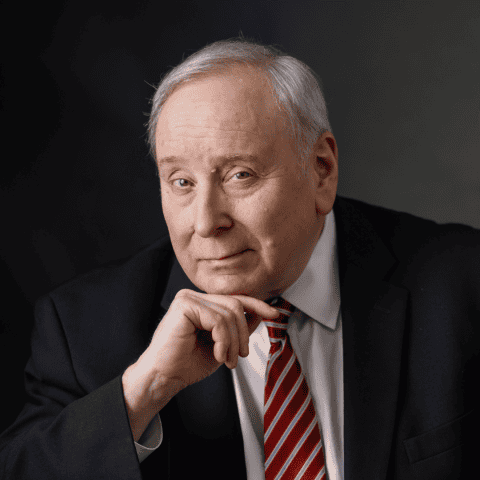 Queer Bloc na antyizraelskim proteście w Londynie, 25 listopada 2023. Zrzut ekranu.
Queer Bloc na antyizraelskim proteście w Londynie, 25 listopada 2023. Zrzut ekranu.
 Benjamin Netanjahu kontra Edward Said: globalna wojna o idee przebudzone
Benjamin Netanjahu kontra Edward Said: globalna wojna o idee przebudzone
Gadi Taub
Tłumaczenie: Małgorzata Koraszewska
Izrael musi teraz udowodnić, że Zachód można odwieść od drogi prowadzącej do kulturowego samobójstwa.
Wojna w Gazie ma znaczenie wykraczające daleko poza jej regionalne aspekty militarne. Odgrywa ona ważną rolę w globalnej wojnie idei, kluczowym froncie w światowej walce z ideologią przebudzenia.
Jej wynik będzie miał znaczenie dla przyszłości liberalnej demokracji. Ponieważ ta wojna jest testem jednego z najważniejszych pytań naszych czasów: czy Zachód odzyska wystarczającą pewność siebie, aby bronić własnych wartości?
To właśnie nadaje pilności bitwie o ramy przedstawiania tej wojny, która rozpoczęła się niemal natychmiast po jej wybuchu. Przebudzeni nie musieli czekać, aż zwęglone, okaleczone i zbezczeszczone ciała żydowskich ofiar ostygną, aby wiedzieć, która strona jest zła.
Zachodni „postępowi” intelektualiści zaczęli niemal natychmiast sugerować, że potrzeba „więcej kontekstu”. A „kontekstem” była, jak można było przewidzieć, „okupacja” — nieważne, że Gaza nie była pod rządami Izraela od 2005 r.
Wyszkoleni w studiach postkolonialnych i obeznani z polityką tożsamości, przebudzeni żywią wrogość do syjonizmu, która jest czymś więcej niż tylko pozycją na ich liście do odrzucenia. Jest to test lakmusowy, za pomocą którego decydują, kto jest „po właściwej stronie historii”.
Palestyńczycy są, w tym ujęciu, tubylczymi ludźmi kolorowymi, a Żydzi są białymi Europejczykami, którzy skolonizowali ziemie palestyńskie. Wszystkie inne szczegóły muszą pasować do tego moralnego schematu.
Gdy wywłaszczenie Indian Ameryki Północnej przeszło do minionej historii, niewolnictwo wymarło na Zachodzie, a europejskie rządy zniknęły z Dalekiego i Bliskiego Wschodu, pozostał tylko syjonizm, który ucieleśnia grzechy Zachodu. Izrael jest, według przebudzonych, tylną strażą zachodniego kolonializmu i nacjonalizmu XIX wieku, ostatnim śladem wstecznych ideologii Zachodu.
Żądanie jego zniszczenia jest zatem zarówno oznaką moralności, jak i rytuałem zadośćuczynienia. To tak, jakby syjonizm był dla przebudzonych lalką voodoo: dźgając ją, pokazuje się, że przezwyciężyło się grzechy Zachodu. Pozbywając się w ten sposób swojego starego, złego „ja”, zachodnie elity przebudzonych są gotowe poświęcić się zadośćuczynianiu dawnym ofiarom swojej cywilizacji, zwracając się przeciwko niej i przeciwko temu, co symbolizuje jej grzeszną przeszłość.
Przebudzeni próbują w istocie oczyścić się z antysemityzmu przeszłości, utrwalając antysemityzm w teraźniejszości, teraz pod przykrywką antysyjonizmu. Grzechy nazistów zostaną odkupione przez nazywanie syjonistów nazistami.
W tym kontekście kulturowym powinno być jasne, dlaczego bitwa o przedstawianie tej wojny nie dotyczy tylko prawa Izraela do obrony przed Hamasem, Hezbollahem i Iranem. Dotyczy prawa Izraela do istnienia. Dotyczy również samej legitymacji syjonizmu.
Oznacza to, że nacisk premiera Izraela Benjamina Netanjahu na moralne uzasadnienie wojny jest również żądaniem wyrzucenia całej budowli, na podstawie której zachodnie „postępowe” elity nadają sens światu — nie pomijając ich własnej polityki wewnętrznej. Jeśli syjonizm jest dla przebudzonych współczesnym paradygmatycznym przykładem grzechów Zachodu, to jego legitymizacja oznacza odrzucenie idei, że grzechy Zachodu mogą wyjaśnić wszelkie zło, które spotkało świat. Co z kolei oznacza zawalenie się całego gmachu przebudzonych.
Dla Netanjahu Izrael, jak najdalszy od reliktu złej, starej kolonialnej przeszłości, jest pionierem, wskazującym drogę do bezpieczniejszej przyszłości. Jest linią frontu zachodniej cywilizacji w jej wojnie z barbarzyństwem. Jest awangardą, która teraz spieszy, by bronić granic cywilizacji tam, gdzie zostały one brutalnie naruszone.
„Jeśli zapamiętacie jedną rzecz z tego przemówienia, zapamiętajcie to” – powiedział Netanjahu w lipcu 2024 r. na wspólnym posiedzeniu Kongresu USA. „Nasi wrogowie są waszymi wrogami; nasza walka jest waszą walką; a nasze zwycięstwo będzie waszym zwycięstwem”.
Podobne wątki poruszył w swoim przemówieniu do Zgromadzenia Ogólnego Narodów Zjednoczonych w październiku, kiedy mówił o „dzikich mordercach”, którzy chcą zniszczyć „naszą wspólną cywilizację”.
W Kongresie Netanjahu zwrócił również uwagę na współpracę zewnętrznych wrogów Zachodu z jego wewnętrznymi, przebudzonymi krytykantami.
„Mam wiadomość dla tych protestujących” – powiedział, odnosząc się do demonstrantów przeciwko jego obecności na Kapitolu, niosących transparenty „Geje dla Gazy”. „Kiedy tyrani z Teheranu, którzy wieszają gejów na dźwigach i mordują kobiety za to, że nie zakrywają włosów, chwalą, promują i finansują was, oficjalnie staliście się pożytecznymi idiotami Iranu”.
Przebudzoność jest chorobą autoimmunologiczną. Atakuje naszą zdolność do obrony naszych wartości. Jej relatywizm moralny najpierw twierdzi, że wszystkie kultury są równe, a następnie przez bramę nieograniczonej tolerancji wpuszcza do swojego wnętrza wartości antyzachodnie. Na koniec odwraca moralność, wykorzystując zachodnie poczucie winy, aby zakazać jakiejkolwiek krytyki rasistowskich, mizoginistycznych, antygejowskich, antysemickich i antyzachodnich ideologii — o ile pochodzą one od grup uznanych za ofiary Zachodu.
Szkody wyrządzone przez tę moralną inwersję są wszędzie takie same. To właśnie skłoniło brytyjskie władze do przymykania oczu na gangi groomingu w imię „stosunków społecznych”; to właśnie skłoniło studentów do poparcia ludobójstwa Żydów w imię „antyrasizmu”; to właśnie skłoniło sądy do wysyłania gwałcicieli do więzień dla kobiet; i to właśnie upoważniło do sterylizacji dzieci w imię „afirmacji gender”.
To również skłoniło Międzynarodowy Trybunał Sprawiedliwości w Hadze do argumentowania, że Izrael, a nie Hamas, powinien być sądzony za ludobójstwo. Osiągnęło to szczyt absurdu, gdy Judith Butler, feministyczna wyrocznia, broniła sadystycznego barbarzyńskiego gwałtu i okaleczenia kobiet żydowskich jako „zbrojnego oporu”.
Ta inwersja jest rzeczywiście wszechobecna na lewicy: instynktowną reakcją administracji Bidena na masakrę Żydów 7 października 2023 r. było powołanie grupy zadaniowej do walki z „islamofobią”.
Misją Netanjahu nie jest oczywiście argumentowanie za subtelnościami teorii queer ani wskazywanie sprzeczności w naukach zmarłego palestyńsko-amerykańskiego aktywisty profesora Edwarda Saida. Jednak jego instynkt wytykania relatywizmu kulturowego i moralnego trafia w samo sedno problemu.
„To nie jest starcie cywilizacji – powiedział Kongresowi, nawiązując do popularnej książki Samuela Huntingtona. – To starcie barbarzyństwa z cywilizacją. To starcie tych, którzy gloryfikują śmierć, z tymi, którzy uświęcają życie”.
Ujmując wojnę w ten sposób i nazywając barbarzyństwo po imieniu, Netanjahu chciał obalić światopogląd, a nie tylko opinię. Jego wezwanie dotyczyło odbudowania naszego układu odpornościowego, abyśmy mogli odzyskać jasność moralną i odróżniać dobro od zła. Jego przemówienie było praktycznie przeciwieństwem światopoglądu głoszonego w Kairze 4 czerwca 2009 r. przez najbardziej wpływowego ucznia Saida — Baracka Husseina Obamę.
Uczniowie samego Obamy wciąż byli u steru, gdy Netanjahu przemawiał do Kongresu. Nie mógł tego powiedzieć wprost, ale musiał być w pełni świadomy, że prosił największe supermocarstwa świata o wyrzucenie moralnego kompasu Obamy i zmianę kursu. Przypadło więc przywódcy małego kraju wzywanie Ameryki i Zachodu jako całości do opamiętania.
„Aby siły cywilizacji odniosły zwycięstwo, Ameryka i Izrael muszą stanąć razem” – powiedział, dodając słynne powiedzenie Ronalda Reagana z czasów zimnej wojny: „Bo kiedy stoimy razem, dzieje się coś bardzo prostego – my wygrywamy, oni przegrywają”.
Mimo owacji na stojąco, jaką otrzymał od senatorów i przedstawicieli Izby Reprezentantów, Netanjahu stanął przed administracją, która odmówiła podjęcia wyzwania, a nawet nazwania zła po imieniu. Nie tylko próbowała udobruchać barbarzyńców; wręcz odmawiała nazywania ich właściwym imieniem.
Najwyższy czas przywrócić prawdę naszemu językowi. Słowo „barbarzyństwo” musi powrócić do naszego leksykonu, jeśli mamy zrozumieć znaczenie wojny na Bliskim Wschodzie, a także niemal każdego centralnego aspektu polityki — krajowej i zagranicznej — w każdej zachodniej demokracji.
Pytanie nie brzmi, czy termin ten daje nam wskazówkę co do rzekomych pozostałości rasizmu u tych, którzy go używają. Nie jest to błędne określenie mające na celu usprawiedliwienie dominacji Zachodu nad niewinnymi ofiarami. Jest to dokładny, prawdziwy opis potężnych wrogów, którzy, gdy mówią, że chcą zniszczyć zachodnią cywilizację, to właśnie chcą zrobić.
Izraelowi przypadła w udziale nie tylko walka z tymi barbarzyńcami o własne przetrwanie, ale także obudzenie Zachodu z jego „przebudzonych” marzeń i nakłonienie go do powrotu do swoich wartości. My, Izraelczycy, nie jesteśmy nieprzyjemną resztką waszej pełnej win przeszłości. Jesteśmy kluczem do waszego przyszłego przetrwania. To było głębsze znaczenie przemówienia Netanjahu.
Nie wszystkie wartości są sobie równe. Nie będziemy w stanie bronić naszych, jeśli będziemy nadal używać wysterylizowanego języka z czasów Obamy i mówić o „radykalnym ekstremizmie”, zamiast nazywać terrorystów z Hamasu, pakistańskie gangi groomingu w Wielkiej Brytanii, muzułmańskich morderców dziennikarzy z „Charlie Hebdo” we Francji lub zabójcę reżysera geja Theo Van Gogha w Holandii imieniem, które ich prawdziwie opisuje: dżihadystyczni barbarzyńcy. Wrogowie humanizmu. Wrogowie liberalizmu i demokracji.
To nie jest tylko teoria. Izrael walczy teraz nie tylko z wrogiem militarnym. Prowadzi również jednoczesną wojnę kulturową przeciwko konstelacji jednostronnych organizacji „praw człowieka”, ośrodków analitycznych i organizacji pozarządowych, stronniczych trybunałów międzynarodowych, przebudzonych gazet, „postępowych” mediów i platform mediów społecznościowych, skorumpowanych uniwersytetów i aktywistów pokojowych, którzy próbują związać nam ręce.
Musimy otwarcie im się przeciwstawić. Musimy przejść do ofensywy i zniszczyć ich moralną wiarygodność. Przede wszystkim musimy wygrać na polu bitwy, pomimo ich najlepszych starań, aby nas powstrzymać, ponieważ jest to kluczowe nie tylko dla istnienia Izraela. Istotne jest również pokazanie, że demokracje potrafią się obronić. Że nie pozwolą, aby ich moralizatorskie elity obróciły ich wartości przeciwko nim, żądając w efekcie poddania się barbarzyńcom.
Nie możemy porzucić naszych wartości, udając, że przestrzegamy ich bardziej skrupulatnie. Izrael musi teraz udowodnić, że Zachód można zawrócić z drogi kulturowego samobójstwa.
Teraz jesteśmy również żołnierzami Zachodu na froncie tej wojnie kulturowej.
Adaptacja wypowiedzi autora na JNS International Policy Summit.
Gadi Taub izraelski historyk i dziennikarz, nauczyciel akademicki, znany również jako autor popularnych książeczek dla dziec
Zawartość publikowanych artykułów i materiałów nie reprezentuje poglądów ani opinii Reunion’68,
ani też webmastera Blogu Reunion’68, chyba ze jest to wyraźnie zaznaczone.
Twoje uwagi, linki, własne artykuły lub wiadomości prześlij na adres:
webmaster@reunion68.com





